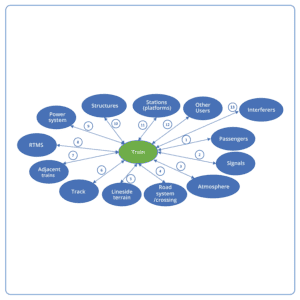Home » Training » Systems Engineering Training Courses » Interface Engineering & Management
Interface Engineering & Management
A unique 16-hour course presented by Paul Davies.
- 2 days or 4 half-days
- Public or Corporate delivery
- In-person or online
- Certificate upon completion
- Professional Development Credits / Units
Get Started Today
View the schedule and register your interest.
Let's Talk
Whether you have a question or are looking to find out more about our training options then please get in touch with us below.
- Summary & Schedule
- Full Schedule
- Course Overview
- Course Outline
- Video
 Avoid the most commonly occurring class of problems experienced in systems of all kinds – interface problems. Every interface is an opportunity to lose information, time, control and/or money through error or contention between stakeholders at each end. Many issues surrounding interface engineering and management are relatively unexplored in the engineering literature – hence the high value for this course.
Avoid the most commonly occurring class of problems experienced in systems of all kinds – interface problems. Every interface is an opportunity to lose information, time, control and/or money through error or contention between stakeholders at each end. Many issues surrounding interface engineering and management are relatively unexplored in the engineering literature – hence the high value for this course.
The groundbreaking course, over two days or four half-days, is simple enough to give anyone with basic common sense and a modest technical knowledge and some engineering experience a clear understanding of how to approach the definition and management of interfaces. Specifically, this course is aimed at the engineer or technical manager who wants to apply best practice techniques to avoid delays, rework and other detrimental consequences of getting interfaces wrong. Whilst focussed on human-engineered physical systems, the course has relevance to interfaces to software and humans.
Eight best practices are fully explained and illustrated to give participants the opportunity to apply the new knowledge. These practices are exploited by leading enterprises, often without formal documentation of the practice, to give a competitive advantage.
The modules are presented in an order comparable to those processes that are followed in a well-run project. A worked case study is used as a central theme, and as a basis for ten “learning by doing” workshops. The first two half-days are spent covering the basics and ensuring a good grounding in the best practices. The third half-day is then spent applying the practices to optimise system architecting around interfaces, and the final half-day covers modeling, documentation and practice writing interface requirements. The course may also be delivered over two full days.
A valuable set of templates and guidelines for writing interface specification documents is also included, as “handouts” and as an online resource.
- This course may be credited toward the maintenance of the INCOSE Certified Systems Engineering Professional (CSEP) certification for 16 Professional Development Units and PDUs may be claimed for PMI’s family of certifications, including PMP
- This course qualifies for Engineers Australia and Engineering New Zealand (IPENZ) CPD purposes (16 hours)
- This course is accredited by ECSA South Africa for CPD 2 points (ref. INCOSE 20/016)
- This course may qualify for CPD, CLP and similar purposes with other organizations (16 instructor hours)
- This course may be credited toward the maintenance of the Project Management Institute (PMI) certifications. Suggested PMI Talent Triangle® PDU allocation:
- Ways of Working – 15
- Business Acumen – 1
Upcoming Courses
Register and pay 30 days prior to the course commencement date to receive a 10% early bird discount. Or register a group of 3+ for a 10% group discount. Available for corporate training worldwide.
(Exclusive to South America)
(Exclusive to South Africa)
Upcoming Courses
Register and pay 30 days prior to the course commencement date to receive a 10% early bird discount. Or register a group of 3+ for a 10% group discount. Available for corporate training worldwide.
(Exclusive to South America)
(Exclusive to South Africa)
Key Learning Objectives:
1. To understand the basic systems engineering concepts and competencies, and the place of interface engineering in the holistic lifecycle.
2. To be able to explain why there is a need for interface definition and management, and its impact on the integrity of the system solution.
3. To be able to identify, define and control the system and system element interfaces, and apply and evaluate that knowledge using a case study.
4. To be able to plan interface management, define processes and appropriate tools, and use these to monitor and control interface engineering activities.
5. To be able to describe possible sources of complexity of the interface definition and management for a project, and provide examples; and to analyze the potential impact on the project using the Integration Readiness Level scale.
6. To be able to identify consequences of changes to interfaces on the system elements, system of interest and/or containing system, and to understand how to manage those changes.
Training Method and Materials:
The training is facilitated using a mixture of presentation and discussion, with a variety of brainstorms and workshops based around a central case study. Instead of presenting a lot of content and hoping that something will ‘stick’, the training utilizes advanced adult learning techniques optimized for the type of content that needs to be mastered. Throughout the course, there is a strong focus on interaction, variety, the social aspects of learning, and integration with the learner’s existing knowledge framework. The result is highly engaging sessions, matched with a high degree of subject mastery. Most participants will find that the course is fun! Our approach to the training is based on world leadership in systems engineering training combined with over 20 years of sound experience in the theory and practice of adult learning.
The course is facilitated by a professionally qualified, world-class, expert leader in the field.
You will be provided with:
- a comprehensive course manual containing the presentation slideset;
- a workbook containing case study workshop exercises
- a separate set of reference answer handouts
- a reference set of interface specification documents, both in hard- and soft-copy form.
Who Should Attend This Course?
This course is designed for personnel who perform, manage, control or specify the development of small to large technology-based systems, even more so those with demanding interoperability needs. It is aimed at any engineer (not just those with the title Systems Engineer) faced with the problem of managing the interfaces from their designs, and who wish to learn more about best-practice techniques in the definition and management of interfaces.
It will be valuable to project managers and operations executives, for whom the stakeholder issues encountered in realisation and acceptance of interfaces, and performance across those interfaces, have become a money-leaking headache.
The course will be of particular value to people with job titles such as:
- Design engineer
- Engineering manager
- Enterprise architect
- Hardware engineer
- Industrial engineer
- Integration engineer
- Interface Control Working group (ICWG) member
- Product manager
- Project engineer
- R and D manager
- Software engineer
- Software systems engineer
- System architect
- Systems analyst
- Systems engineer.
Do you Offer Tailoring of this Course?
Yes. All courses are tailored informally verbally in delivery by selecting, where possible, examples matched to the domains of interest to the class. We can also work with you to design a formally customized curriculum for the development of your people. We have done so for many client companies, and we would love to work with you to this end. We always suggest that a client takes the corresponding standard course prior to any customization. For systems engineering, this is because systems engineering is the problem-independent and solution technology-independent principles and supporting methods for the engineering of systems, based on systems thinking. So the objectives of customization need to be very clear and focused on adding further value. In practice, customization, if performed, usually becomes the replacement of examples and possibly the main workshop system with domain-specific equivalents. Substitution of the workshop system usually involves substantial redevelopment of courseware. Out of necessity, formal tailoring of courseware is performed on a fee basis.
Day 1 (or days 1 and 2 for half-day deliveries)
1 Introductions, outline and mindmap
2 Basic systems concepts and relationships
3 What’s Special about interfaces? Brainstorm, discussion and reference solution
4 Types or Categories; Brainstorm, discussion and reference solution
Morning break
5 Conceptualisation of Interfaces – the notional plane of the interface, and Context diagrams
6 Introduction to the Case Study
7 Context diagram – Case Study Workshop 1
Lunch
8 Stakeholders – who are they, and what do they want? Case Study Workshop 2
9 Context Diagram refinement + application to organisations; Case Study Workshop 3
10 Scenarios for animating the black box context diagram – Case Study Workshop 4
11 Sources of complexity – candidate list, discussion of personal experiences, outline of tools & methods
Afternoon break
12 Interface lifecycle timeline; N-squared charts, example at black box level
13 Black box N-squared chart – Case Study Workshop 5
14 N-squared charts at System Element level – white box example
Review of learning, homework – candidate white box N-squared chart for Case Study Workshop 6
Day 2 (or days 3 and 4 for half-day deliveries)
15 Part 2 Introduction
16 Architecting through Interfaces using Design Patterns
17 Architecting Practice – Optimisation – Case Study Workshop 7
18 Completeness checking; integrating Sequence Diagrams, N-squared charts, black box / white box models
Morning break
19 Elastic links exercise or simulation 2; discussion on impact of clustering / concentrator nodes
20 Timeline of Activities; Configuration States, Stepwise agreement, future-proofing and documentation; Case Study Workshop 8
21 Configuration & Change control; Case Study Workshop 9
Lunch
22 Planning for Integration, Verification and Validation (IVV); brainstorm personal stories, Dos & Don’ts
23 Use of models & MBSE tools versus document-centric; lessons learned and discussion
24 The IRS/ICD template – handout and discussion
25 Review of Requirements knowledge, and relationship to requirements specification; a template
Afternoon break
26-7 Final Workshop 10 to create a draft IRS/ICD for part of Case Study
28 Review of new knowledge, Q&A, and feedback
Each Break will resume with a review of learning. There may be homework!
Featured Course Reviews

Great material and the knowledge of the presenter. The course provided very valuable information that will be put to use immediately.
Anthony

I learned a great deal about my co-workers by observing their reactions to the course material – an invaluable part of the course for me. I will also benefit from the templates and other example/reference material. Being able to use these tools or standard templates will also be highly beneficial.
Jane

Good structure in the course, supplemented by professional course material, presented by a presenter who knew what he was talking about.
Luke

Great material and the knowledge of the presenter. The course provided very valuable information that will be put to use immediately.
Kate
More Courses For You
Architectural Design
Establish & maintain strong system solution relationships
CTI SE-ZERT®
Achieve SE-ZERT Certification
INCOSE SEP Exam Preparation Course
Achieve INCOSE SEP Certification
Interface Engineering and Management
Avoid interface problems
Model-Based Systems Engineering (MBSE) Foundations
Organize your information in standard models for power & reuse
Systems Engineering
Fulfilling the promise of innovation on demand
Systems Engineering Executive Overview
ROI of SE practices
Systems Engineering Management
Achieve SE & Program/Project Management alignment
Systems Engineering Overview
Develop system solutions